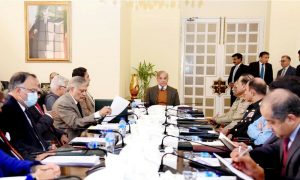In a significant development, the National Security Advisers of Pakistan and India have reestablished communication following a series of missile strikes by India into Pakistan and Azad Jammu Kashmir early Wednesday morning.
Pakistan’s NSA, Lt General Asim Malik, who also serves as the Director General of the ISI, reached out to his Indian counterpart, Ajit Doval. This move appears to be part of ongoing efforts to ease tensions, as noted by officials who are in the know.
“Yes, the National Security Advisers from both Pakistan and India are in contact,” confirmed Deputy Prime Minister and Foreign Minister Ishaq Dar in an interview with The Express Tribune.
He refrained from sharing any specifics regarding the discussions or the purpose behind the communication between the two NSAs.
A Pakistani official emphasized that maintaining such lines of communication is crucial during times of crisis.
It’s believed that these contacts were initiated after intense diplomatic maneuvering by various international and regional players.
US Secretary of State Marco Rubio, who also holds the NSA position, reached out to both the Pakistani and Indian NSAs shortly after the missile strikes and Pakistan’s subsequent reaction.

While the National Security Committee (NSA) indicated that Pakistan would respond to the Indian missile strikes at a time and place of its choosing, Prime Minister Shehbaz Sharif’s remarks in the National Assembly hinted that Pakistan might not escalate the situation further.
Sources have indicated that Pakistan received a warning from a third country about the impending Indian missile strikes. Additionally, these channels reportedly informed Pakistan that India was not looking for further escalation.
When India carried out airstrikes in Balakot back in February 2019, right after the Pulwama attack, it caught Pakistan completely off guard. Since 1971, Indian fighter jets had never crossed the Line of Control (LoC), so this was a bold move.
While Pakistan was expecting some kind of response from India, they never imagined that the Modi government would take such a significant risk. Although the Indian jets only dropped payloads that didn’t cause much real damage, New Delhi aimed to send a strong message to both its own citizens and Pakistan, signaling a shift in the dynamics of their relationship.
Given the unexpected nature of India’s actions, Pakistani officials took a full day to figure out their next steps. Dr. Moeed Yusuf, who was the National Security Adviser at the time, mentioned that despite India’s aggressive move in Balakot, both civil and military leaders in Pakistan were still exploring non-military ways to ease the rising tensions. Ultimately, Pakistan decided to retaliate by shooting down an Indian fighter jet and capturing its pilot.
What set this situation apart was the clear stance taken by Pakistan. Officials were adamant that if India launched any further attacks, Pakistan would respond with a quid pro quo, and then some. There were explicit orders for the armed forces to act decisively and quickly if India struck again.
In the early hours of Wednesday, as reports began to surface from places like Muzaffarabad to Kotli and Muridke to Bahawalpur about multiple explosions, Pakistan realized that India had initiated the strikes it had been planning since the Pahalgam attack.
There was a total media blackout in India regarding the losses it faced due to Pakistan’s strong reaction. The Hindu, one of the oldest and most respected newspapers, initially reported that three Indian fighter jets had been shot down, but the article was quickly taken down, seemingly due to pressure from the Indian government to prevent any embarrassment.
An American commentator shared with CNN that if the reports of Pakistan shooting down Rafale jets were accurate, it would be a significant setback for India, especially since they had been boasting about their air superiority following the introduction of these French-made aircraft.
Some experts believe that the conflict between the two nations is essentially a test of Chinese and Western technology. According to officials, Pakistan has J-10C jets, which are Chinese-made and were acquired after India added Rafale jets to its fleet.
On Wednesday, a high-ranking French intelligence official informed CNN that one Rafale fighter jet from the Indian Air Force was indeed shot down by Pakistan, marking the first time one of these advanced French warplanes has been lost in combat.
This is a major development and suggests that China now possesses cutting-edge technology, according to the American commentator.
For the latest updates and insights on new developments, visit the NEWSON
Q1What triggered the recent communication between the NSAs of two neighboring nuclear states?
A: The National Security Advisers of Pakistan and its eastern neighbor reestablished contact after a series of missile strikes across the border, affecting areas in Azad Jammu and Kashmir.
Q2: Who initiated the contact and what’s its significance?
A: Pakistan’s NSA, Lt General Asim Malik (also head of the ISI), reached out to his counterpart Ajit Doval in an apparent move to ease mounting tensions. This development is being seen as a key step in crisis management efforts.
Q3: Was this communication confirmed officially?
A: Yes. Deputy Prime Minister and Foreign Minister Ishaq Dar confirmed the contact but declined to reveal details of the conversation.
Q4: Were other international players involved in de-escalation efforts?
A: Yes, US Secretary of State and NSA Marco Rubio reportedly contacted both NSAs shortly after the strikes. Diplomatic sources suggest significant pressure from global and regional stakeholders to contain the situation.
Q5: How has the past influenced current military strategies between the two countries?
A: After the Balakot airstrikes in 2019, both countries altered their posturing. This time, Pakistan appeared more prepared and responded swiftly to the latest aerial intrusion, reportedly downing advanced fighter jets.
Q6: Has either country officially acknowledged the damage or losses?
A: There was a media blackout across the eastern border regarding losses. Independent reports and brief coverage from international outlets suggest a substantial setback, including the downing of a Rafale fighter jet.


